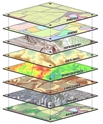
21 – Government support shifts

Government support payments, such as JobKeeper and the Coronavirus supplement for job seekers, were always temporary mechanisms to create a safe harbour where we could weather the immediate COVID storm.
But they are not the solution to walking back from a recession. It is no longer a matter of just weathering a storm.
This week, we take a look at how government support and investment programs are shifting: challenging us to leave our safe harbour and start on the journey to recovery, choppy though the waves may be for a while.
It’s more important than ever to see what jobs are out there
If you’re an employer, taking a look at jobs in your industry can show you what you are competing with to attract talent.
For job seekers, you might be surprised what jobs are out there.
Top Ten industries and sectors with jobs this week

Where the jobs are
Ballarat, VIC | Orange |
Bathurst | Parkes |
Byron Bay | Parramatta |
Coffs Harbour | Shepparton, VIC |
Dubbo | Sydney |
Goulburn | Tamworth |
Lismore | Tweed Heads |
Spotlight
 | We’ve recently listed a fantastic temporary assignment for a Geographic Information Systems Specialist in the Bathurst region. Find out more |
For more information
Take a look at our current job opportunities
Also check out the Australian Government Jobs Hub
It’s time to move forward
Thanks to COVID, our pathway into a recession has been hard and fast, and the pathway out will be long and slow … but there are lights at the end of the tunnel for employers and jobseekers

With all the media attention on recent reduction of JobKeeper and JobSeeker payments, you might be surprised to know that some are welcoming the changes.
In a quick poll we took, over 70% of employers found it hard to recruit staff in the COVID-environment during the first half of this year.
Despite unemployment numbers being at their highest, employers of all sizes told us they were experiencing a reduction in job applicants particularly for entry-level and casual jobs; and larger employers were struggling to attract senior-level staff. They believe it is because of people’s desire to stay safe and avoid risk.
Those employers are hoping the change will motivate people who can work, particularly university graduates, to start looking again; and those who are in jobs, to consider a career move to new workplaces and geographic locations.
And we need to do this. Because every time we start a new job, or change jobs, we are stimulating economic movement and output. In short, we have to work our way out of a recession.
What does a recession mean?
Those of us working in the early 90s, remember the last recession in 1991-92 with unemployment at 11%, compared to the current 6.8% (7.1% in Victoria).
The Reserve Bank of Australia explains that there is no single definition of recession though it is broadly defined as a sustained period of weak or negative growth in real GDP (output) that is accompanied by a significant rise in the unemployment rate (labour market) and weakness in other economic indicators such as:
Household spending
Investment by business
Ability of households and businesses to pay back loans
Business closures
The conventional school of thought is that when we have had two consecutive quarters of negative growth in real GDP and accompanying weakness in the other indicators, we are in a recession.
But here’s one thing to keep in mind. The recent advice that we are in a recession is based on government reporting which is retrospective, i.e.. the first two quarters of 2020. In other words, we’re not just entering a recession now we have already been living and working in one since COVID hit.
It is no longer a matter of weathering a storm
Until a vaccine is rolled out, we must learn to live and work with COVID; to adapt to a volatile environment of closures and re-openings (of states, communities and businesses), social distancing and quarantines.
In addition, the impact of COVID will be felt in the economy for years to come.
Have we accepted this as the new normal? Are we ready to change how we have always done things? Are we prepared to make some hard decisions … go in a new direction … take some risks … be bold?
These are some of the questions employers and job seekers must ask themselves to move forward.
The lights on the horizon
Our economy has not been hit as hard as many other countries. This creates a solid foundation for recovery.
The 2020-21 Budget announced this week, shows us how the government is transitioning from ‘safe harbour’ measures to more targeted programs to stimulate business activity, create jobs and bring the unemployment rate down.
The budget allocations the government is making show employers and job seekers where new opportunities may be found. These include investments in:
infrastructure
tax incentives to encourage businesses to invest in assets and asset improvements
the NBN to help businesses leverage digital technology
education, skills and apprenticeships
manufacturing and research & development to strengthen national supply chains and capabilities
electricity, gas and fuel supplies
regional Australia
recycling infrastructure and waste management
Opportunities can also be found in other initiatives recently announced, including investments in:
the supply and production agreement for Australian manufacturing of COVID vaccine
These investments are supported by extensions of:
JobKeeper until 28 March 2021 focused on businesses and not-for-profits who have been hardest hit by COVID
Coronavirus Supplement for job seekers until 31 December 2020
the Pandemic Leave Disaster payment for those who must self-isolate or care for someone in home quarantine for 14 days
Find out more about topics covered in this update
What a recession means to jobs, property, rates, super & how long will it last
Head to Health – a one-stop online guide to help you look after metal health for yourself or others
Until next week, stay safe.
Download PDF version of this update
